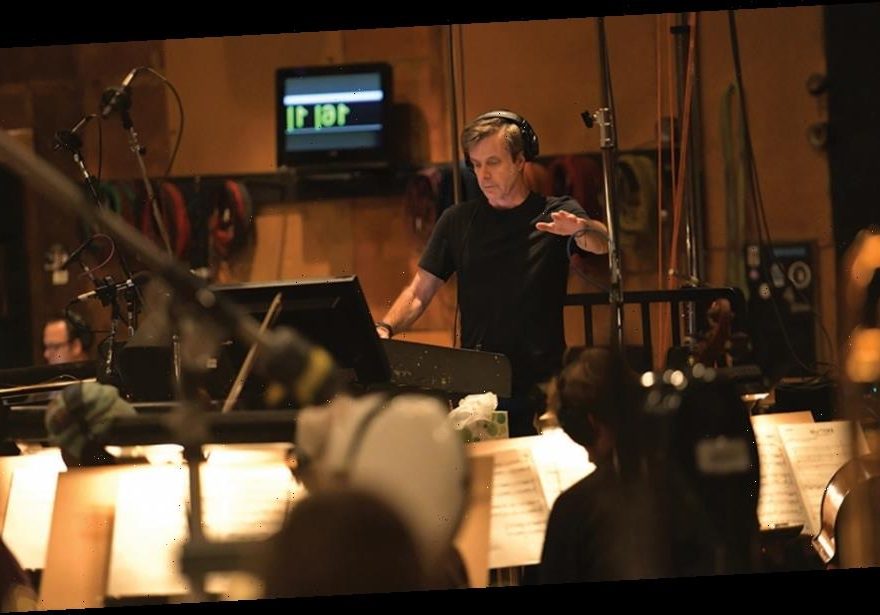It’s a Thursday afternoon in December, and on the big screen at the Sony scoring stage, swords are flashing, arrows are flying and soldiers in ancient Chinese garb are spinning in midair.
Composer Harry Gregson-Williams is conducting a 90-piece orchestra in his score for Disney’s “Mulan” (currently available on Disney Plus), the live-action remake of the 1998 animated classic about a girl who disguises herself as a man to take the place of her ailing father in battle. “Brass, mezzo forte at bar 103,” he says just before a take. “Lots of energy! Tense buttocks!” he adds, to the laughter of musicians.
The lights dim, the red recording light is illuminated, and for three minutes the stage echoes with the sounds of pounding percussion, screaming brass and fast-moving string figures. Cue 8M37, “The Emperor Is Taken,” is in the can, and director Niki Caro pronounces it “amazing.”
Three months later, in the wake of the L.A. premiere but before the coronavirus pandemic thwarted release plans, Caro explained that she trusted Gregson-Williams (with whom she had worked on “The Zookeeper’s Wife”) to maintain the film’s “balance of cultural authenticity but also deliver the soundtrack for a really big global movie — a robust, muscular, adrenalized action movie [that’s] also a deeply emotional movie.”
No stranger to films rooted in ancient times and locales, Gregson-Williams (“Prince of Persia,” “Kingdom of Heaven,” “The Chronicles of Narnia”) understood that “cultural authenticity” meant finding the right Chinese sounds to flavor the score. He arranged for several Chinese soloists to fly to Bangkok, where longtime London colleague Richard Harvey (“an amazing ethnic flutist”) has a studio, to record music that would eventually be layered into the score.
Among the unusual instruments heard in “Mulan” are the xiao, an end-blown bamboo flute; dizi, a bamboo membrane flute; guanzi, a woodwind of darker colors; the pipa, a Chinese lute; the guzheng, a plucked harp-like instrument; and the erhu, a two-string bowed instrument. Massive taiko drums are also heard throughout the score, along with various Chinese percussion instruments.
In fact, building the beat is how Gregson-Williams started — writing drum patterns for soldiers to play on-screen during the New Zealand shoot. Soon he was composing themes at the piano even though he hadn’t seen any footage.
“Mulan’s theme came quite easily and quickly,” he remembers. “It had to have a certain innocence, but it also had to have the ability to be bold, to accompany her riding into battle.” To this he added a touching father-daughter motif; grim sounds, including Tuvan throat singing, for the villain, Böri Khan (played by Jason Scott Lee); and an erhu-based signature for the mysterious and powerful witch Xianniang (Gong Li).
A 48-voice choir also wordlessly bolsters the emotional content at various points throughout the film.
The score contains surprises, including references to songs from the original “Mulan.” “It was really important to honor the 1998 animation in certain critical ways,” Caro explains. “I looked for scenes or moments or sounds that recalled that movie, which defined the childhood of a generation 20 years ago. The live-action, I like to think, represents a coming of age for the audience, so I wanted to give them touchstones.”
She asked Gregson-Williams to incorporate “Reflection,” the earlier film’s best-known song, at key moments in the narrative, notably when Mulan rides into battle. It’s “where she commits to her own version of truth, being wholly and authentically female, no longer disguised as a man,” Caro says. “That’s where we open up that huge orchestral version. We encouraged Harry to be as epic as possible in that arrangement.”
There is also a cute reference to another 1998 song, “Honor to Us All,” during the matchmaker sequence before Mulan dons her disguise and joins the army.
“Reflections” makes two more prominent appearances at the end of the film, in a new vocal version produced by Gregson-Williams and sung by Christina Aguilera (who sang the pop version for the 1998 original) and then in a Mandarin-language version, sung by the film’s star Yifei Liu and produced by “Reflections” composer Matthew Wilder.
Preceding the “Reflections” vocals is a new song, “Loyal Brave True,” based on Gregson-Williams’ Mulan character theme and also sung by Aguilera.
The composer spent 18 months on the project, “much longer than any other film,” in part because the post-production period was unusually long. “There was a slight rebalancing, recalibrating of the tone of the film” that required rewriting a number of cues, he explains.
With three daughters (ages 21, 6 and 4), the very positive female-empowerment message of “Mulan” resonates strongly in the Gregson-Williams household. “If you ask me which is my favorite family movie that I’ve done,” he says, “I’d probably say ‘Mulan.’”
Source: Read Full Article
